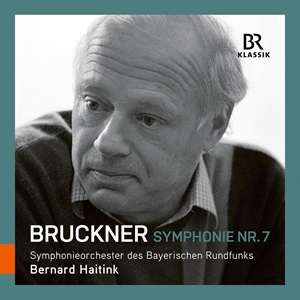
Anton Bruckner (1824-1896)
Symphony No 7 in E major (1885 version ed. Nowak) (1881-3)
Symphonieorchester de Bayerischen Rundfunks/Bernard Haitink
rec. live, 19-20 November 1981, Herkulessaal der Residenz, Munich
BR Klassik 900218 [64]
Bernard Haitink left a particularly fine discography for this work; there are several highly recommendable live performances with him conducting the Netherlands Radio Philharmonic, the Chicago Symphony and the Vienna Philharmonic, the latter currently being my overall preferred recording of this symphony (review).
This live recording is from almost forty years earlier than the VPO performance of 2019. It being made in 1981, it is thus on the cusp of the last great leap forward in sound for commercially recorded classical music. I was unsure whether it is analogue or digital but “digital audio” appears in tiny text on the back, and the sound is first-rate.
Like so many conductors, Haitink’s interpretations slowed slightly as he aged; hence, comparison with that VPO recording reveals the following differences:
| Allegro | Adagio | Scherzo | Finale | Total | |
| 1981 BRSO | 20:06 | 22:07 | 9:26 | 12:09 | 63:48 |
| 2019 VPO | 21:47 | 22:05 | 11:01 | 13:22 | 68:15 |
As you may see, the Adagio remains unchanged, but in all three of the other movements Haitink has somewhat relaxed by 2019 – although we are talking about only a minute or two per movement. Those relatively minor differences apart, his interpretation has remained largely unchanged over that large span of time; it is spacious, yet dramatic when required.
I very much like the serene grandeur of the introduction and once again I am reassured of my relatively late discovery that Haitink’s temperament made him a natural Brucknerian – at least with regard to how I like the music to go. There is no sense of rush but plenty of momentum; Haitink builds beautifully to the first five minutes in, just before the start of the third subject, which is nicely lilting and bucolic. The playing of the BRSO is lovely, too, especially the characterful woodwind. The second climax after ten minutes is likewise imposing, with the brass well forward but still properly balanced against the strings. After a passage of artfully graded dynamics – one long arch of crescendo and diminuendo with the timpani playing a vital role – the chorale coda is absolutely magnificent. The Adagio unfolds in stately fashion, melting into the gentle Gesangsperiode where the strings really sing – and it almost goes without saying that the great cymbal climax is sumptuously delivered before an unusually reflective and melancholy coda. The Scherzo is fast(er) and (more) furious than Haitink’s VPO performance – indeed, more conventional but effective. The finale is also just that bit more urgent, again showcasing that the virtuosity of the orchestra we now take for granted was already very much present; the brass are again monumental. It all hangs together and marches inexorably towards that brief but glorious apotheosis which crowns one of Bruckner’s shorter final movements.
I cannot say that this is more recommendable than the recent VPO account, only indicate the minor differences and leave preference to individual taste.
(As ever, I recycled the superfluous cardboard sleeve, also inexplicably favoured by the Capriccio label in its ongoing Bruckner2024 series.)
Ralph Moore
Help us financially by purchasing from




















